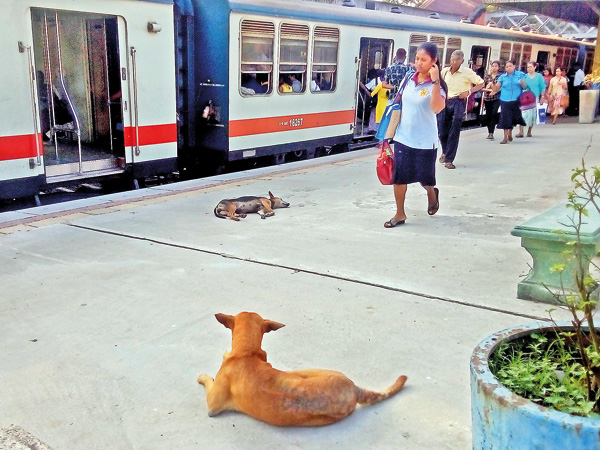News
Dog programme tossed like a ball between ministries
The previous government’s decisions to keep tossing the dog sterilisation programme between ministries last year resulted in a regime that saw the work stymied for months.

There are around 3 million dogs in the country (one dog for every eight people). A third of these animals, are owned but allowed to roam the streets, in effect, as community dogs. Pic by Priyantha Wickramaarachchi
That situation probably led to a greater increase of strays on the street, both ministry officials and an NGO in the sector suggested.
There are around 3 million dogs in the country (one dog for every eight people). A third of these animals, according to the health ministry, are owned but allowed to roam the streets, in effect, as community dogs.
In 2019, the then government took the dog sterilisation programme off the Ministry of Agriculture’s Department of Animal Production and Health (DAPH) but later flicked it back to the Ministry of Health, which had administered it in past years.
The health ministry said the decision to transfer the programme away from the DAPH meant that authority and resources had been in a state of flux and neither body had acted on the programme for months, resulting in an increase in strays in the street
The ministry’s Public Health Veterinary Service (PHVS) Director, Dr. L.D. Kithsiri, said dogs had not being sterilised for almost nine months in 2019.
For its part, DAPH, through its Acting Director General, Dr. Ranjini Hettiarachchi, said it could not effectively function in 2019 because of the transition period.
“The Health Ministry did the programme for 30 years and then it was transferred to us and again taken back by the Health Ministry within a year,” she said.
“The transfers has cost loss of time to both parties in accepting and streamlining processes.”
The cabinet decision to put the programme back in the hands of the health ministry was taken in March 2019, with the DAPH transferring all responsibilities to the health ministry along with a stock of 8 million vaccines.
The health ministry then had to set up a network of regional offices to run the programme and was able to start satisfactory sterilisation work only in August 2019. Last year, only 1.2 million rabies vaccines were administered, most only in the latter months when the health ministry was able to get the programme back up and running after the repeated transfers. This year, the target is 2 million vaccinations. In 2006, the then government of President Mahinda Rajapaksa stopped stray dogs from being caught and gassed, opting instead to control their birth rate through sterilisation.
The DAPH was put in charge of the programme but according to the health ministry had lacked the expertise for the task, taking time to streamline processes to conduct vaccination and sterilisation of community dogs.
This made it difficult for Sri Lanka to keep the terms of its agreement with the World Health Organisation to eradicate rabies through a target of vaccinating 70 per cent of the dog population against rabies. That target had initially been given a 2020 deadline but this has now been shifted to 2030 given the mismanagement of the sterilisation and vaccination programmes.
Adding to the problems, last year the health ministry lacked funds to implement the sterilisation programme, with the then government repeatedly declining requests for adequate funding according to Dr. Kithsiri.
The health ministry said there had been 26 deaths last year from rabid dog bites. The most fatalities occurred in Kurunegala, where five people died, with three more fatalities in Ratnapura, two each in Gampaha, Kalutara, Galle, Hambantota and Trincomalee and one death each in Anuradhapura, Kandy, Matale, Batticaloa and Moneragala.
Dr. Kithsiri said that the vaccination and sterilisation programmes are going well and if the process continues the aim of a rabies-free Sri Lanka by 2030 could be achieved.
He said while there were no statistics to lean on, the delays in implementing the sterilisation programmes had probably led to an increase in the dog population last year.
The Animal Welfare and Protection Association (AWPA) concurs with this view saying it had seen puppies dumped in many places throughout the country. “Residents complain that they have appeared overnight,” AWPA President, Mrs. Hemanth Jayatilake said.
The association was established 25 years ago to care for stray and abandoned dogs and cats, and allocates Rs. 100,000 to sterilise 70-100 animals a year.
Mrs. Jayatilake said incidents of rabies infection by dog bite have decreased. She could not give any figures but said during sterilisation programmes carried out countrywide there had been fewer complaints of dog bites and many dog owners were showing enthusiasm in vaccinating their dogs. AWPA said it was ready to work with the health ministry in providing assistance to monitor, supervise in the vaccination process as well as with providing post-operation care for animals that are sterilised

